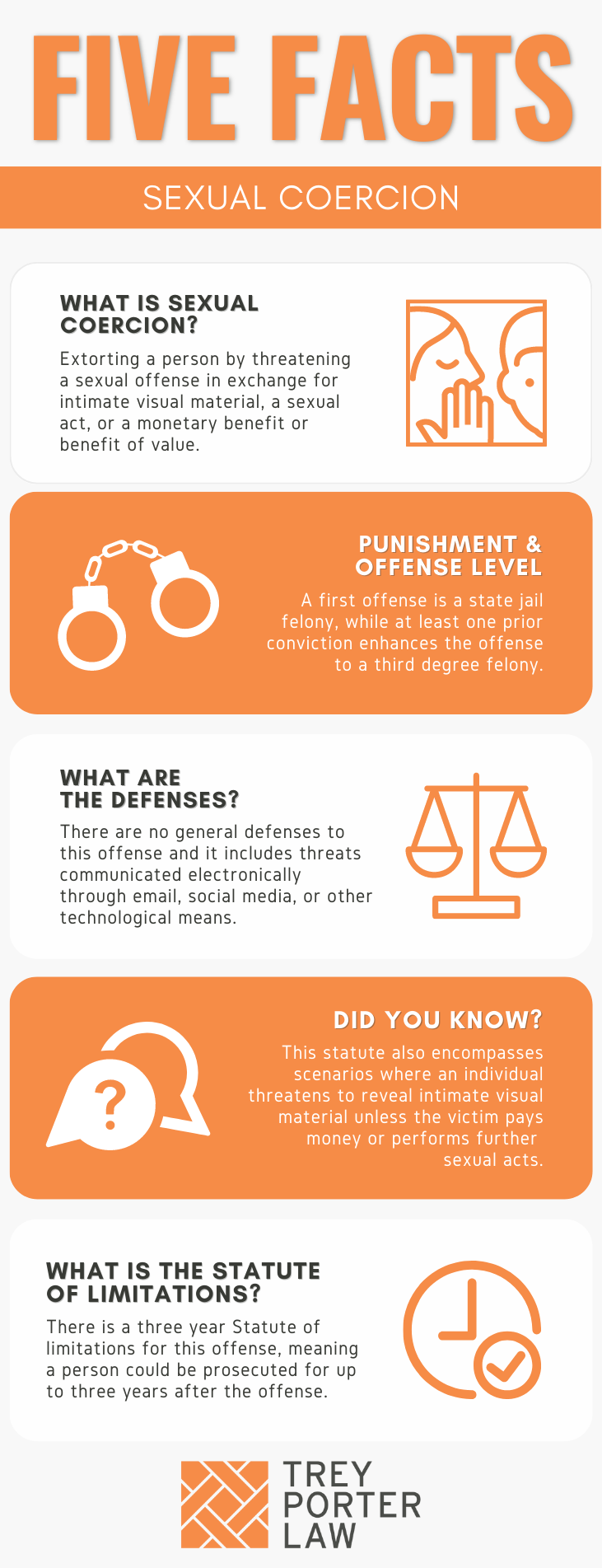WHAT IS SEXUAL COERCION IN TEXAS?
Sexual coercion is extorting or blackmailing another person to extract money, valuable property, sexual favors, or elicit photographs or videos from that person. The statute lists examples of extortion or blackmail by threatening to commit an offense, including compelling prostitution, human trafficking, continuous sexual abuse, sexual assault, or indecency with a child, among several others. The threat may be communicated through social media, a website, in person, or by any other means.
WHAT IS THE SEXUAL COERCION LAW IN TEXAS?
Tex. Penal Code § 21.18. SEXUAL COERCION.
(b) A person commits an offense if the person intentionally threatens, including by coercion or extortion, to commit an offense under Chapter 43 or Section 20A.02(a)(3), (4), (7), or (8), 21.02, 21.08, 21.11, 21.12, 21.15, 21.16, 21.17, 22.011, or 22.021 to obtain, in return for not committing the threatened offense or in connection with the threatened offense, any of the following benefits:
(1) intimate visual material;
(2) an act involving sexual conduct causing arousal or gratification; or
(3) a monetary benefit or other benefit of value.
(c) A person commits an offense if the person intentionally threatens, including by coercion or extortion, to commit an offense under Chapter 19 or 20 or Section 20A.02(a)(1), (2), (5), or (6) to obtain, in return for not committing the threatened offense or in connection with the threatened offense, either of the following benefits:
(1) intimate visual material; or
(2) an act involving sexual conduct causing arousal or gratification.
(d) This section applies to a threat regardless of how that threat is communicated, including a threat transmitted through e-mail or an Internet website, social media account, or chat room and a threat made by other electronic or technological means.
(e) An offense under this section is a state jail felony, except that the offense is a felony of the third degree if it is shown on the trial of the offense that the defendant has previously been convicted of an offense under this section.
WHAT IS THE PENALTY CLASS FOR SEXUAL COERCION IN TEXAS?
Sexual coercion is a state jail felony, punishable by 180 days to two years in a state jail facility. The punishment is more severe for repeat offenders: if someone has been convicted at least once previously of sexual coercion, a subsequent offense is enhanced to a third degree felony, punishable by two to ten years in prison.
- Can sexual coercion be enhanced to a second degree felony? Yes. if the offense is committed against a public servant, or a member of the public servant’s family or household, in retaliation for or on account of the public servant’s status or service, the penalty classification is increased to a second degree felony, punishable by two to 20 years in prison. See Tex. Penal Code § 12.501.
WHAT IS THE PUNISHMENT RANGE FOR SEXUAL COERCION IN TEXAS?
The punishment range for sexual coercion charged as a state jail felony is 180 days to two years in a state jail facility, and up to a $10,000 fine. The second time a person is convicted of sexual coercion, it is a third degree felony, which carries between two and ten years in prison, and up to a $10,000 fine.
If committed against a public servant and enhanced to a second degree felony, the punishment range is two to 20 years in prison, and a maximum $10,000 fine.
WHAT ARE THE PENALTIES FOR SEXUAL COERCION IN TEXAS?
A person charged with state jail felony sexual coercion may be eligible for probation after a conviction, or deferred adjudication without a conviction, for a period between two and five years, with the possibility of extending supervision for up to ten years. A person charged with sexual coercion as a third degree or second degree felony may be placed on probation or deferred adjudication for up to ten years.
WHAT ARE THE DEFENSES TO SEXUAL COERCION IN TEXAS?
The statute does not authorize any defenses for sexual coercion, but a person may attempt to negate one of the elements the State must prove beyond a reasonable doubt.
WHAT IS THE STATUTE OF LIMITATIONS FOR SEXUAL COERCION IN TEXAS?
The limitation period for sexual coercion is three years.
SEXUAL COERCION IN TEXAS
Sexual coercion is usually committed in addition to other offenses, including human trafficking, compelling prostitution, or sexual abuse of a child, elderly, or disabled individual. This statute was enacted in 2017 to deter conduct surrounding sexual offenses by criminalizing any threats to force another to commit certain acts, including non-consensual sexual acts.













